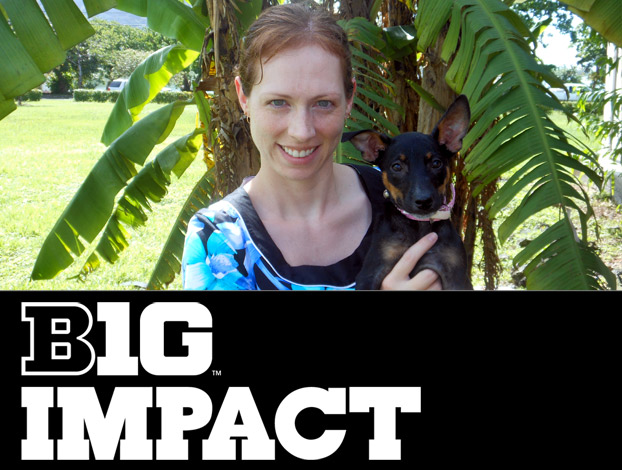
By Jacob Zlomke
As Kimberly Hyde, ’06, puts it, life is slower paced and “scaled way down” in America Samoa, a Pacific island territory of the United States.
Feral dogs roam the small island—often adopted by temporary residents from the mainland—fast-food chains are sparse and the largest movie theater houses only two screens. There are few major roads on the mountainous island and the speed limit rarely extends beyond 25 miles per hour. But on an island that stretches 26 miles in length, and 6 miles at its widest, 25 mph may not be so slow.
And until April 2014, this is where Hyde finds herself employed. She is in the midst of a two-year contract as assistant attorney general working as a felony prosecutor. Hyde said her job as prosecutor includes standard practices of filing charges, and preparing motions and depositions. However, she said the scaled-back legal culture presents many additional responsibilities.
“Here my job also includes being my own secretary and sometimes investigator due to the fact that police officers are poorly trained,” Hyde said in an email interview.
CULTURE DIFFERENCES IN THE COURT ROOM
Differences in American Samoa legal culture extend beyond extra responsibility, though. A more relaxed culture, Hyde said no one in court wears suits and almost everyone, judges included, wear flip-flops every day.
Given the relatively small population of the island (almost 56,000 in 2010), there are two judges that handle felony cases, and Hyde said both are rarely subject to any checks and balances, which, she said, allows them the freedom to “get away with things U.S. judges wouldn’t.
“One in particular uses his position to exude power in ways that really go beyond what a judge should do, and there really isn't any accountability.”
Hyde said this particular judge has threatened, and done so, to hold in contempt and to lay fines to attorneys that are simply doing their job.
“You have to be careful what you say and do.”
Hyde has been a practicing lawyer for five years, and despite what she considers a short time in the profession, she said she is often more knowledgeable of the law than the judges, yet she finds herself in a position unable to correct the judges.
“That was a huge adjustment,” she said. “You just have to let him make the incorrect decision.”
In American Samoa court, there also sits a panel of judges, but Hyde said the term is applied loosely, as the panel often consists of one member that holds a law degree and one or two well-regarded members of the community. This panel serves to ensure American Samoan customs and culture are respected. These judges don’t speak in court, and while they do confer on sentencing, their function as actual judges is limited.
Despite the differences, and sometimes limitations, of the legal system in which Hyde works, she said it did not take her long to acclimate.
“There was definitely a learning curve,” Hyde said, “and some of it was unlearning because the system is just not as developed here. But I would say, I’ve been here three and a half months, and I know how to do my job, so it didn’t take long to figure things out.”
NOT JUST ACCLIMATING – ADVANCING
Hyde has been made acting chief of the criminal division, a position only granted to competence. She said moving into a supervisory position is fairly easy, as many workers in the legal system are contract workers like herself, so the people are constantly rotating in and out.
Nonetheless, Hyde said her success has no doubt been bolstered by her Nebraska Law education. Mock trials in her trial advocacy class taught her the basics of questioning witnesses and doing cross-examinations and making opening statements, and her evidence class prepared skills that she uses every day in her job, Hyde said.
Hyde found her rather unique position through a former coworker and friend, who also took a job as a prosecutor on the island; however, this is far from her first experience outside the United States. She said working and living abroad has long been an interest of hers.
“I was an exchange student in Hungary in high school; I studied abroad in Germany in college; after college, I went to language school in Italy; and during law school, I did a study abroad in Argentina.”